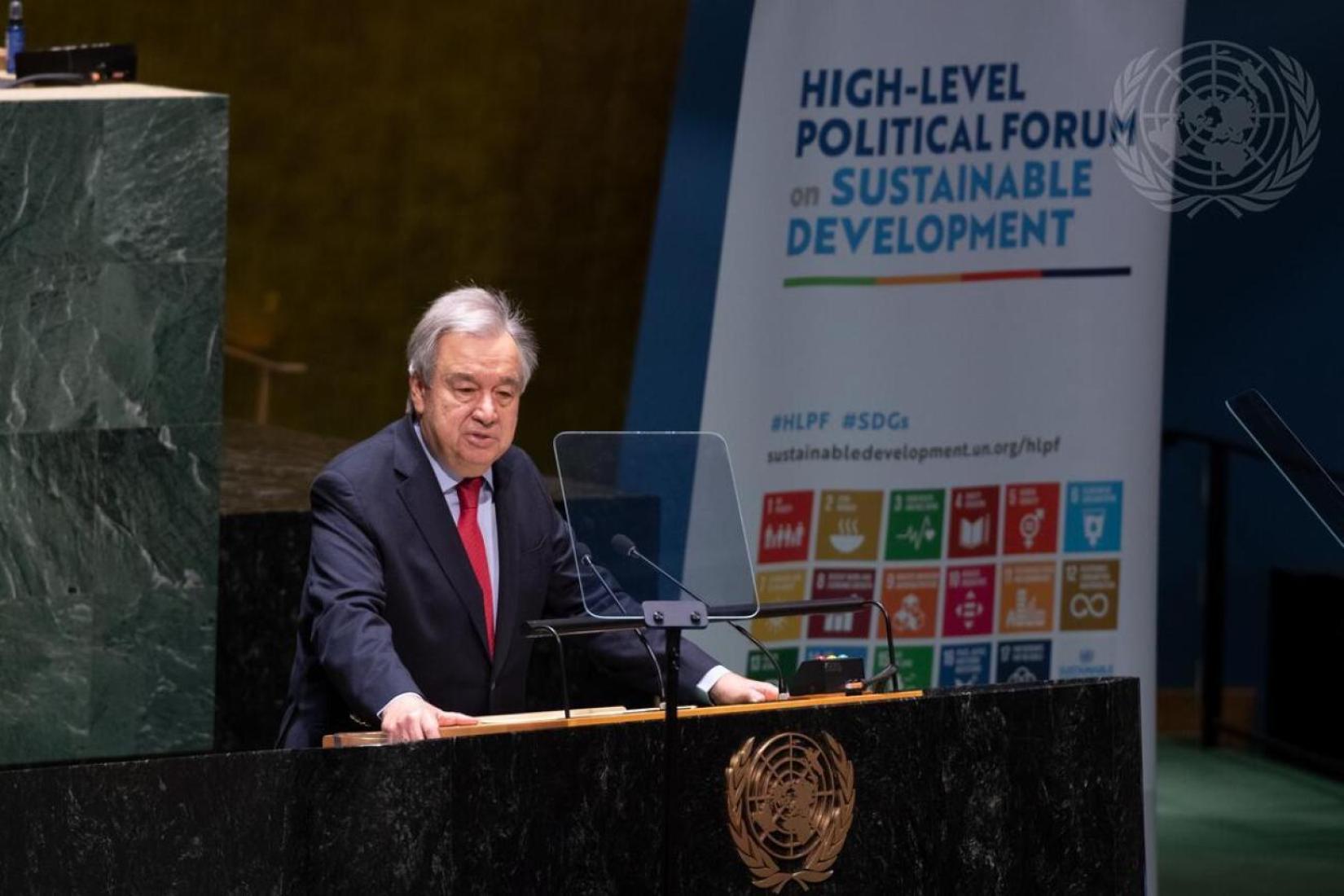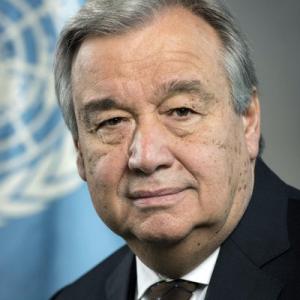UN Secretary-General's remarks to High-Level Political Forum on Sustainable Development 2023
The 2030 Agenda is in peril, but we can make a difference if we act now.

High-Level Political Forum on Sustainable Development
New York, 17 July 2023
[Bilingual, as delivered]
I. Introduction
Madame la Présidente du Conseil économique et social,
Monsieur le Président de l’Assemblée générale,
Mesdames et Messieurs les Ministres, Excellences, Mesdames et Messieurs,
II. The State of Sustainable Development Goals
En 2015, les États se sont engagés à l’unanimité en faveur du Programme de développement durable à l’horizon 2030 – un plan d’action pour aider la marche du monde vers la paix, la prospérité et la dignité pour tous.
Aujourd’hui, cette promesse est en péril.
À mi-chemin de l’échéance de 2030, le monde est terriblement mal parti.
L’édition spéciale du rapport sur l’état d’avancement de la réalisation des Objectifs de développement durable dresse un tableau très sombre.
Il montre la faiblesse et l’insuffisance des progrès réalisés pour une bonne moitié des cibles de développement durable.
Près d’un tiers de ces cibles sont au point mort ou enregistrent une régression.
Les émissions continuent d’augmenter.
Les inégalités béantes persistent.
La faim atteint à nouveau les niveaux de 2005.
Au rythme actuel, il faudra encore 300 ans pour parvenir à l’égalité des genres.
Et près de 600 millions de personnes seront encore enlisées dans l’extrême pauvreté en 2030.
III. Challenges and Setbacks
Excellences, Mesdames et Messieurs,
La pandémie de COVID-19, une crise climatique en pleine expansion, des conflits généralisés et les consequences de l’invasion de l’Ukraine par la Russie ont entravé des progrès fragiles et limités.
Mais soyons clairs : bien avant ces bouleversements, notre monde n’était déjà pas bien engagé.
Le manque d’ambition, le sentiment d’urgence et la solidarité ont fait défaut.
Il en va de même des financements.
De nombreux pays sont au bord du gouffre financier.
Le déficit annuel de financement des Objectifs de développement durable est désormais estimé à 4,2 trillions de dollars – contre 2,5 trillions avant la pandémie.
Les promesses faites en matière d’Aide internationale au développement et de financement de l’action climatique n’ont pas été tenues.
Les gouvernements croulent sous les dettes, les pays en développement devant faire face à des coûts d’emprunt très élevés.
Et 52 pays sont en défaut de paiement ou près de l’être, sans qu’aucun système efficace d’allègement de la dette ne soit en vue.
IV. Call for High-Level Political Action
Excellencies,
This is the High-Level Political Forum.
The world is crying out for high-level political action.
Action to make the Sustainable Development Goals a reality – for everyone, everywhere.
Without it, the 2030 promise is in danger of slipping away:
Sowing disillusionment, mistrust, and resentment;
Imperiling the planet;
Failing women and girls;
And denying opportunity and hope for millions of people.
In our dangerous and divided world, no country can afford such an outcome.
It is in all our interests to choose a different path.
V. The Way Forward
So Excellencies,
The 2030 Agenda is that path.
It is a route to bridging divides, restoring trust and building solidarity.
I urge every country to make 2023 count.
Lay the ground now for coordinated efforts to get the Sustainable Development Goals on track – by making the most of the Food Systems Summit Stocktaking, the Climate Ambition Summit, the three health meetings, the preparatory meeting for the Summit of the Future, the G20, the Annual Meetings of the Bretton Woods Institutions, COP28, and – of course – above all the SDG Summit.
Specifically, I urge every government to come to the SDG Summit with clear plans and pledges to strengthen action in their countries to 2030.
We need ambitious national commitments and interventions to reduce poverty and inequality by 2027 and 2030.
And clear policies, investment plans and partnerships to drive progress across major SDG transitions.
We also need the SDG Summit to re-energize civil society, businesses, and others to throw their weight behind the goals – strengthening the global movement to deliver.
I welcome the engagement and moral voice of young people and civil society here this week. And I urge you to continue to fight for the SDGs.
Above all, we need the SDG Summit to send a clear message from world leaders through a strong political declaration.
As the negotiations are now in the final days, I urge each and every delegation to show flexibility and ambition so that together we rise to meet the moment.
We need a political declaration that renews and revitalizes the SDG promise;
That lays a path for faster progress on key SDG transitions, from social protection and jobs, to energy, education and more;
And that sends a clear signal on finance: by demanding urgent action to deliver the SDG Stimulus and by paving the way for much-needed reforms of the international financial architecture.
VI. Finance for Sustainable Development
Why?
Because finance is the fuel that will drive SDG progress.
Yet today’s international financial system is failing:
It is failing to provide developing countries with long-term, affordable finance for development and climate action.
And it is failing to provide those countries with a safety net in the face of shocks.
I have called for a new Bretton Woods moment.
And put forward a Policy Brief proposing how we can redesign the global financial architecture so that it operates as a global safety net for all countries and provides access to affordable long-term finance.
At the same time, we can and must act now to provide immediate relief to developing and emerging economies.
That is why I have proposed the SDG Stimulus of $500 billion per year for investments in sustainable development and climate action.
We need a massive surge in finance, including through increasing the capital base of Multilateral Development Banks.
And through changing their business models so they leverage far more private finance at reasonable cost to developing countries.
The SDG Stimulus also calls for action on debt – urging leaders to establish a timely and effective debt relief mechanism that supports payment suspensions, for countries facing severe shocks, longer lending terms, and lower rates.
And it calls for an expansion of contingency financing for countries in need, including through rechanneling Special Drawing Rights, or SDRs, including through Multilateral Development Banks – the multiplier effect.
This can all be achieved now – if there is sufficient political will.
We need meaningful strides in the right direction by the end of 2023.
So, I am urging G20 countries to set a timeframe this year to establish a new debt resolution mechanism.
And developed countries to honour their commitments on climate finance:
Deliver the promised $100 billion this year; replenish the Green Climate Fund, and double funding for adaptation.
This cannot wait.
Excellencies,
Every one of our SDG goals demands that we accelerate climate action.
The World Bank estimates that up to 130 million people could be pushed into poverty by 2030 because of rising temperatures.
Already, now, today: wildfire smoke is choking people across North America;
Lack of food is taking lives in the Horn of Africa;
Floods and hurricanes are destroying homes and wrecking livelihoods around the world.
All this when temperatures have risen 1.1 degrees Celsius.
Yet, current polices are taking us to an increase of 2.8 degrees.
This is madness.
But it is not too late to change course.
Limiting the rise in global temperature to 1.5 degrees is possible if the world takes a quantum leap in climate action, together.
To achieve this, I have proposed a Climate Solidarity Pact – in which big emitters make extra efforts to cut emissions; and wealthier countries support emerging economies to do so.
And I have put forward an Acceleration Agenda to super-charge these efforts.
This asks countries to accelerate their net zero timelines, in line with the principle of common but differentiated responsibilities and respective capabilities, in light of different national circumstances.
This means developed countries committing to reach net zero as close as possible to 2040 and emerging economies as close as possible to 2050.
And it asks them to take concrete steps to phase out fossil fuels, to deliver climate justice, and to accelerate a just transition and a renewables revolution.
We must show that we are serious if we are to rebuild trust between nations.
By the end of COP28, I count on all G20 leaders to have committed to ambitious new nationally determined contributions.
And I urge all parties to ensure that COP28 operationalizes the loss-and-damage fund.
Excellencies.
We face a bleak picture with challenges at every turn.
But as we cross the halfway mark to 2030, one overriding truth stands out in my mind:
Change is possible.
Backsliding is not inevitable.
Poverty, pollution, and gender inequality are not pre-ordained.
They are trends that can be reversed, problems that can be solved, tragedies that can be averted, lives that can be saved.
And together, we can deliver.
Let’s make this year count.
Let’s keep the promise.
Thank you.










